#Journalistic bias
Text
Media Manipulation, Bias, Cooperation and its impact
Media manipulation, misinformation, and propaganda are part of conflicts world wide. Every country, government, NGO, and agency engages in these tactics in some way. There is a story to be told from a certain perspective that pushes an agenda. What we, as the consumer of such media, have to do is determine if we're being fed a biased perspective and/or outright lies that we can then parse through.
The current I/P war has seen a huge influx of misinformation and propaganda from social media and traditional news sources. The former is expected as we are in the era of influencers and algorithms. However, traditional sources, such as the AP or WashingtonPost, have long been an issue when it comes to coverage of Israel and Palestine.
Matti Friedman wrote about this a decade ago in an article for the Atlantic titled What The Media Gets Wrong About Israel.
Friedman is a former journalist for the AP and throughout their piece details the biased reporting that they witnessed firsthand, the association with terrorist groups, the influence of terrorists on reporting, and the outright corrupt nature of an organization that touts itself as a bastion of good journalism.
From the article:
------------------------------------------------------------------------------
Most consumers of the Israel story don’t understand how the story is manufactured. But Hamas does. Since assuming power in Gaza in 2007, the Islamic Resistance Movement has come to understand that many reporters are committed to a narrative wherein Israelis are oppressors and Palestinians passive victims with reasonable goals, and are uninterested in contradictory information. Recognizing this, certain Hamas spokesmen have taken to confiding to Western journalists, including some I know personally, that the group is in fact a secretly pragmatic outfit with bellicose rhetoric, and journalists—eager to believe the confession, and sometimes unwilling to credit locals with the smarts necessary to deceive them—have taken it as a scoop instead of as spin.
During my time at the AP, we helped Hamas get this point across with a school of reporting that might be classified as “Surprising Signs of Moderation” (a direct precursor to the “Muslim Brotherhood Is Actually Liberal” school that enjoyed a brief vogue in Egypt). In one of my favorite stories, “More Tolerant Hamas” (December 11, 2011), reporters quoted a Hamas spokesman informing readers that the movement’s policy was that “we are not going to dictate anything to anyone,” and another Hamas leader saying the movement had “learned it needs to be more tolerant of others.” Around the same time, I was informed by the bureau’s senior editors that our Palestinian reporter in Gaza couldn’t possibly provide critical coverage of Hamas because doing so would put him in danger.
Hamas is aided in its manipulation of the media by the old reportorial belief, a kind of reflex, according to which reporters shouldn’t mention the existence of reporters. In a conflict like ours, this ends up requiring considerable exertions: So many photographers cover protests in Israel and the Palestinian territories, for example, that one of the challenges for anyone taking pictures is keeping colleagues out of the frame. That the other photographers are as important to the story as Palestinian protesters or Israeli soldiers—this does not seem to be considered.
....
When Hamas’s leaders surveyed their assets before this summer’s round of fighting, they knew that among those assets was the international press. The AP staff in Gaza City would witness a rocket launch right beside their office, endangering reporters and other civilians nearby—and the AP wouldn’t report it, not even in AP articles about Israeli claims that Hamas was launching rockets from residential areas. (This happened.) Hamas fighters would burst into the AP’s Gaza bureau and threaten the staff—and the AP wouldn’t report it. (This also happened.) Cameramen waiting outside Shifa Hospital in Gaza City would film the arrival of civilian casualties and then, at a signal from an official, turn off their cameras when wounded and dead fighters came in, helping Hamas maintain the illusion that only civilians were dying. (This too happened; the information comes from multiple sources with firsthand knowledge of these incidents.)
Colford, the AP spokesman, confirmed that armed militants entered the AP’s Gaza office in the early days of the war to complain about a photo showing the location of a rocket launch, though he said that Hamas claimed that the men “did not represent the group.” The AP “does not report many interactions with militias, armies, thugs or governments,” he wrote. “These incidents are part of the challenge of getting out the news—and not themselves news.”
------------------------------------------------------------------------------
Back in 2021 the IDF destroyed the AP's building because Hamas was using it as a base as well. The AP denied all knowledge of Hamas being in the building, except Friedman and other journalists had previously established that there was a relationship between the terrorists and news outfit. The insistence on denying Hamas's actions for fear of reprisal and to continue the "moral failure" narrative is part of AP's m.o.
This standard of avoidance regarding Hamas's actions, couching them in a comparison of "Hamas is bad, but look how much worse Israel is!", justify, or even reduce the horrid nature of them has been part of the formula for years. It explains why we see so many of the major news sources tell the same story in the same manner when it comes to this area. Talking about Hamas, PIJ, and other groups and their bad actions is taboo.
Another quote from earlier in the article stands out that highlights this rhetoric.
"In these circles, in my experience, a distaste for Israel has come to be something between an acceptable prejudice and a prerequisite for entry. I don’t mean a critical approach to Israeli policies or to the ham-fisted government currently in charge in this country, but a belief that to some extent the Jews of Israel are a symbol of the world’s ills, particularly those connected to nationalism, militarism, colonialism, and racism—an idea quickly becoming one of the central elements of the “progressive” Western zeitgeist, spreading from the European left to American college campuses and intellectuals, including journalists."
Many of us have talked about the antisemitism that is baked into most cultures, and a Jewish journalist documented through their own experiences how that is an inherent part of a "trusted" international news source. The fact that it was/is "in vogue" to paint Israel and its actions as the "moral failing of Jews" and hold them responsible for all the "evils" of the region while handling terrorist groups with kid gloves is abhorrent. It's antisemitic and a continuation of age old conspiracies.
Every decade we say this is an issue, and every decade you forget or brush it aside.
#jumblr#leftist antisemitism#antisemitism#activism#israel#palestine#AP#Journalistic bias#Antisemitism in journalism
91 notes
·
View notes
Text
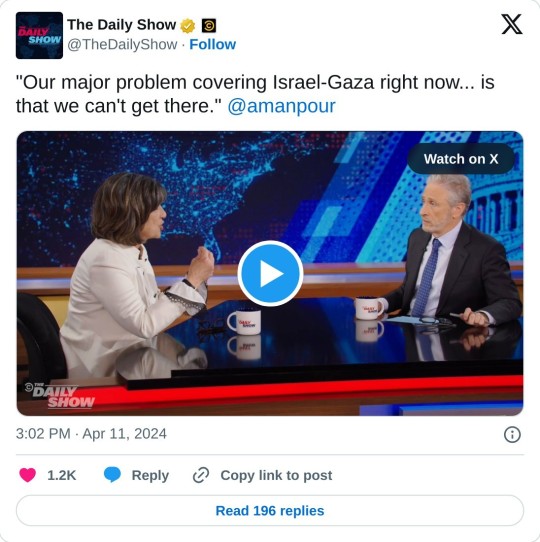
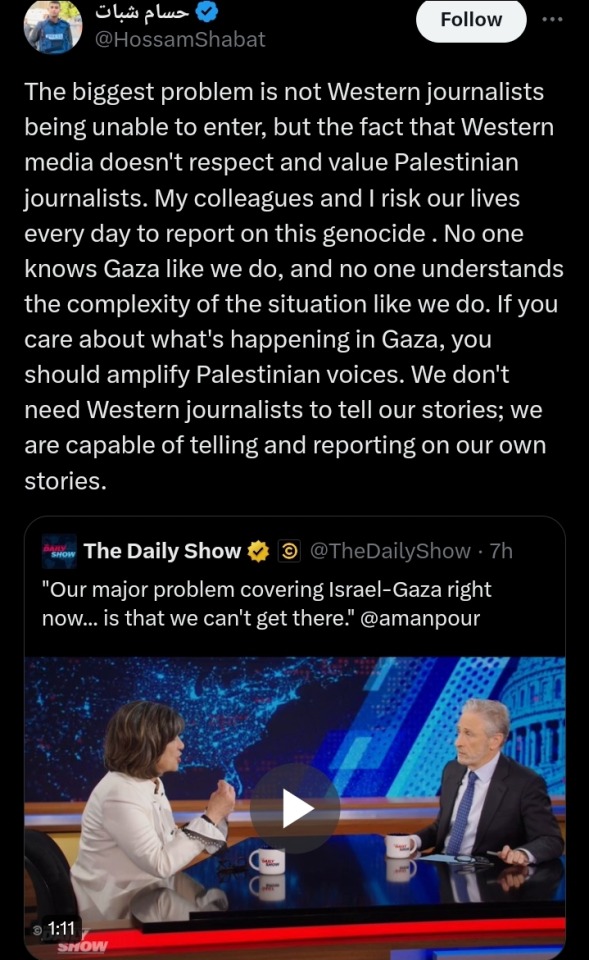
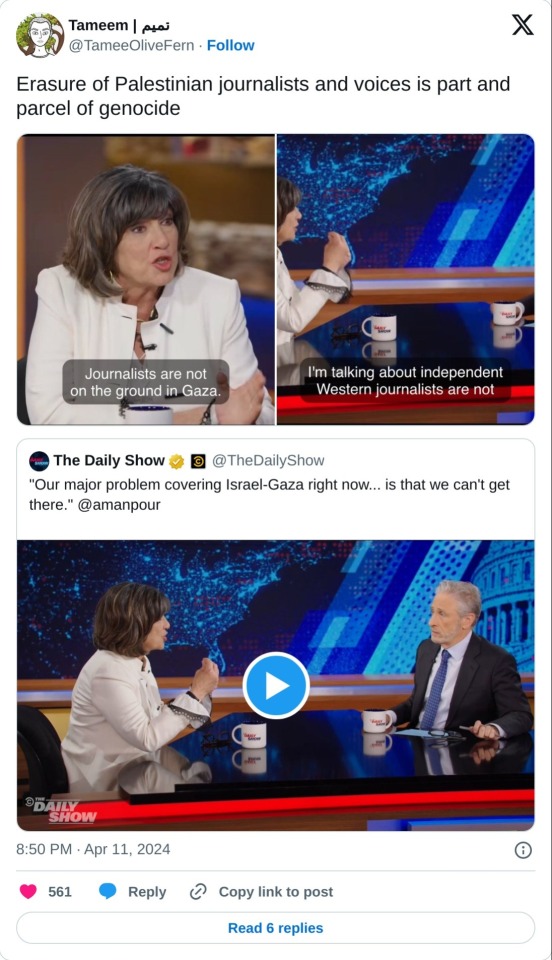

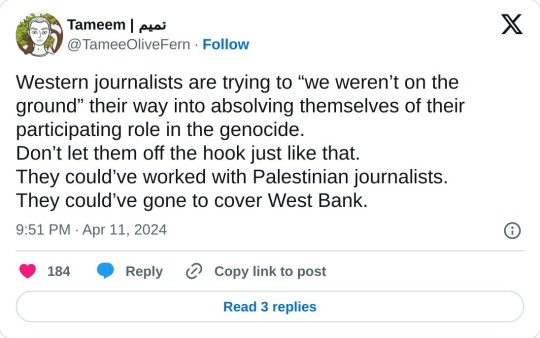

#yemen#jerusalem#tel aviv#current events#palestine#free palestine#gaza#free gaza#news on gaza#palestine news#news update#war news#war on gaza#palestinian journalists#manufactured consent#media bias#gaza genocide#genocide
15K notes
·
View notes
Text
Reuters’ Ethics and Standards editor told HonestReporting on Tuesday that the wire service “disputes” our “claim” that its journalists had “decorate[d] their office with terror symbols.”
This despite photo evidence we exposed last week showing scarves with terror groups insignias decorating what used to be Reuters office in Gaza in 2013:

The man in the photo is Reuters current Head of Visuals for Gaza, Suhaib Jadallah Salem. The photo still appears on his Facebook page.
Like the Nazi Swastika, the emblems on the scarves are of genocidal groups — Hamas, Islamic Jihad, al-Aqsa Martyrs Brigades — that call for the killing of Jews/Israelis (like some of Suhaib’s colleagues in Reuters).
There are only two bad explanations to Reuters’ disturbing response: ” Either it doesn’t view these proscribed terror groups as such, or it is denying indisputable evidence.
The rest of Reuters Ethics and Standards editor Brian Moss’s official response did not address our exposure of its journalists in Gaza receiving awards from senior Hamas officials.
Instead, it said: “On the basis of a close review by the Reuters Ethics and Standards department, we dispute the distorted evidence and insinuations of bias in the HonestReporting September 5th article. We stand by our coverage of Gaza and our team, who operate within the Thomson Reuters Trust Principles…Further, we dispute any claim that our journalists received ‘de-facto bribes from terrorists.'”
But here are the facts, which HonestReporting stands behind:
Our review of Palestinian media revealed that since 2015, the proscribed terror group has hosted annual ceremonies to honor Gazan journalists who had won prestigious international awards, including photographers from Reuters.
This cozy relationship between Gaza’s terror groups and the journalists tasked with covering them objectively is ethically flawed. It exposes the disturbing entanglement between terrorists and the media, shaping a distorted global narrative about Gaza.
Honored by Terrorists
In 2017, Hamas held a commendation event for international award-winning journalists in Gaza, where it honored Reuters photographer Suhaib Jadallah Salem — the agency’s current head of visuals for Gaza (who was photographed in Reuters office in front of the terror groups’ scarves.)
One of the photos from the event shows Suhaib’s brother Mohammed Jadallah Salem, a Reuters photographer who recently won the Pulitzer prize and the World Press Photo award, receiving Suhaib’s commendation plaque on his behalf. Two senior Hamas officials are granting the plaque: Khalil al-Hayya and Mushir al-Masri:

Al-Hayya has publicly called for a fight against Israel as “the head of the serpent,” and al-Masri has vowed to “uproot The Zionists With Our Axes, Knives, Guns.”
Receiving commendation from such terrorists is a mark of Cain. It should get any journalist disciplined by any respectable media outlet.
Yet Reuters journalists — knowing perhaps that their bosses won’t find out or even care — had no qualms getting into bed with Hamas. Another photo from the event shows other Reuters journalists around a table not too far from al-Hayya: Reuters Senior Gaza correspondent Nidal al-Mughrabi is sitting near Suhaib’s brother Mohammed and photographer Ashraf Amra (who was also honored at the event and exposed by HonestReporting for endorsing infiltration into Israel on October 7). Beside them is Belal Jadallah, who headed the allegedly “independent” Gaza Press House:

Suhaib himself attended a separate Hamas commendation event for journalists later in 2017. This time, he was honored for performing the Muslim pilgrimage to Mecca:

Suhaib received the commendation from al-Masri and Hamas spokesperson Fawzi Barhoum (who have often been interviewed by Reuters), along with the movement’s media officials.
It’s worth noting that four of the Jadallah brothers work for Reuters, in Gaza and Dubai. And the links of the Jadallah family to Hamas go back years. One of the brothers of Suhaib and Mohammed, Sallah, was among the terrorists who kidnapped and killed Israeli soldier Nahshon Waxman in 1994.
The mastermind behind that operation was Moahmmed Deif, who was recently eliminated by Israel. As Hamas’ military chief, Deif was also one of the masterminds behind the October 7 massacre in southern Israel.
If Suhaib and Mohammed were professional journalists, such background wouldn’t necessarily matter. But if they have been hosted and honored by Hamas, it’s alarming.
Unethical Nexus
Top news editors probably know it’s impossible to be a journalist in Gaza without links to Hamas, which controls the information flow. In other words, professional journalism in Gaza is impossible, and news outlets should admit it to their audience.
But being hosted by Hamas, receiving its commendations, and displaying terror groups’ insignias isn’t a case of journalists even trying to be professional. This is an agenda-driven, cooperative, symbiotic, reciprocal, and personal nexus that benefits each side.
A Hamas statement from one of the commendation events said it best:
The media office of Hamas organizes this annual event to honor creative journalists for the fourth year in a row, in appreciation of their efforts in serving the Palestinian cause.
Journalists who violate the agency’s code of ethics by receiving de-facto bribes (or at least benefits) from terrorists to “serve the Palestinian cause,” and decorate their office with terror symbols, are not deserving of international praise or the defense of the Reuters Ethics and Standards department.
#reuters ethics and standards#reuters#reuters ethics and standards editor#media bias#hamas#gaza#suhaib jadallah salem#journalists
68 notes
·
View notes
Text
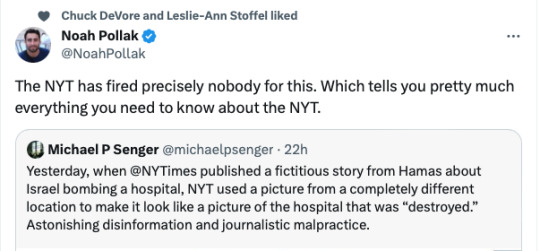
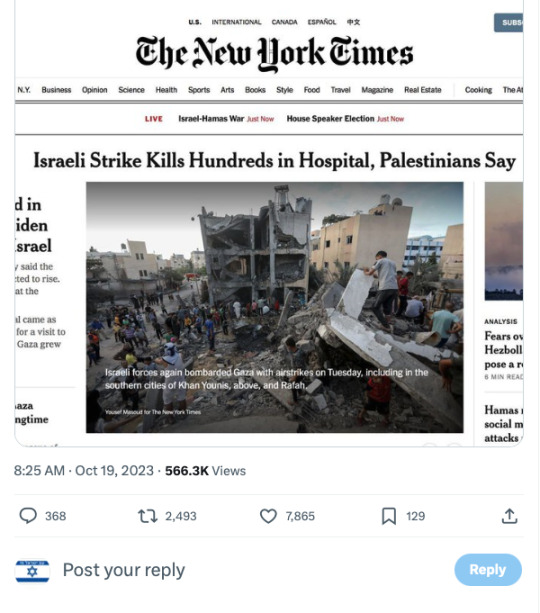
Source
129 notes
·
View notes
Text
NPR has suspended Uri Berliner, the senior editor who published a bombshell essay a week ago that claimed that the publicly funded outlet has “lost America’s trust” by approaching news stories with a left-wing bias.
NPR media writer David Folkenflik revealed on Tuesday that Berliner beginning on Friday was suspended for five days without pay. Folkenflik, who reviewed a copy of the letter from NPR brass, said the company told the editor he had failed to secure its approval for outside work for other news outlets — a requirement for NPR journalists.
NPR called the letter a “final warning,” saying Berliner would be fired if he violated NPR’s policy again.
Neither NPR nor Berliner immediately responded to requests for comment.
Berliner is a dues-paying member of NPR’s newsroom union, but Folkenflik reported that the editor is not appealing the punishment.
Berliner, a Peabody Award-winning journalist who has worked at NPR for 25 years, called out journalistic blind spots around major news events, including the origins of COVID-19, the war in Gaza and the Hunter Biden laptop, in an essay published Tuesday on Bari Weiss’ online news site the Free Press.
The fallout from the essay sparked outrage from many of his colleagues. Late Monday afternoon, NPR chief news executive Edith Chapin announced to the newsroom that executive editor Eva Rodriguez would lead monthly meetings to review coverage.
The fiasco also ignited a firestorm of criticism from prominent conservatives — with former President Donald Trump demanding NPR’s federal funding be yanked — and has led to internal tumult, the New York Times reported Friday.
NPR’s new chief executive Katherine Maher defended NPR’s journalism, calling Berliner’s article “profoundly disrespectful, hurtful, and demeaning,” The 42-year-old exec added that the essay amounted to “a criticism of our people on the basis of who we are.”
Folkenflik said Berliner took umbrage at that, saying she had “denigrated him.” Berliner said he supported diversifying NPR’s workforce to look more like the US population at large. Maher did not address that in a subsequent private exchange he shared with Folkenflik for the story.
The fiasco soon put the spotlight on Maher, whose own left-leaning bias came to light in a trove of woke, anti-Trump tweets she penned.
In January, when Maher was announced as NPR’s new leader, The Post revealed her penchant for parroting the progressive line on social media — including bluntly biased Twitter posts like “Donald Trump is a racist,” which she wrote in 2018.
That hyper-partisan message was scrubbed from the platform now known as X, but preserved on the site Archive.Today.
It’s unclear when Maher deleted it, or if its removal was tied to her new gig.
Other woke posts remain on Maher’s X account. In 2020, as the George Floyd riots raged, she attempted to justify the looting epidemic in Los Angeles as payback for the sins of slavery.
“I mean, sure, looting is counterproductive,” Maher wrote on May 31, 2020.
“But it’s hard to be mad about protests not prioritizing the private property of a system of oppression founded on treating people’s ancestors as private property.”
The next day, she lectured her 27,000 followers on “white silence.”
“White silence is complicity,” she scolded. “If you are white, today is the day to start a conversation in your community.”
The NPR job is Maher’s first position in journalism or media.
She was previously the CEO of the Wikimedia Foundation, the San Francisco-based nonprofit that hosts Wikipedia, after holding communications roles for the likes of HSBC, UNICEF and the World Bank.
Maher earned a bachelor’s degree in Middle Eastern and Islamic studies from New York University, according to her LinkedIn account, and grew up in Wilton, Conn. — a town that her mother, Ceci Maher, now represents as a Democratic state senator.
#nunyas news#if you are a journalist your job is to find the truth#and report it honestly#and without bias
31 notes
·
View notes
Text
cobra kai characters ranked by how likely they are to succumb to the 2024 established characters going gay phenomenon. a post i could theoretically make
#like it’s not that kind of show so the likelihood for any is low#but if you’d asked me a month ago i would have said the boys amazon prime video wasn’t that kind of show either. so#anything is possible fr#to be fair i only watched one season of that show five years ago and i hated it. so. journalistic bias
12 notes
·
View notes
Note
Not that it’s a surprise, but Jensen’s character is not the leader of the group. (Technically, Walker isn’t the leader either, but still Walker is called Walker, Countdown isn’t called Meachum)
https://t.co/dBEOFhnQHs
But the funniest part is how your favorite faux journalists are announcing the news vs the regular entertainment news sites.
Well, it is an ensemble show by the guy who helped create the Chicago franchises. It could be like Eamonn Walker was the fire chief of the crew on Chicago Fire, but wasn't the lead.
However, there are some curious differences that I noticed. One... Eric Dane is, arguably, in a higher tier than Jensen. I mean, just look at his bio in the press release:


Eric Dane is in high demand and is very busy. Frankly, I'm surprised he has time to even film this role.
The second point that I find curious is the character description:

Compare that to how Jensen's character was described (or not described):

It feels like Dane's character was created as the lead rather than Jensen's. Just imagine Jensen and Jared's characters on SPN being described as a couple of brothers who are recruited to fight monsters. Meanwhile JDM's character is described as a rough, Vietnam-hardened vet who finally found love and family, but, in the midst of tragedy, is forced to put everything on the line to learn about things beyond this world to avenge his wife's mysterious death.
Who do you think is the lead in that scenario? I'm just saying...
As for the faux journalists? Let me see, Jensen's announcement:

vs. Eric and Jessica's announcements:


Oh yeah, there's no bias there. /s/
Anyway, I'll be interested to see which character ends up being the true powerhouse of the series.
#ask box#countdown#casting announcements#anti faux journalists#anti monica gleberman#always with the bias#I'd put this in the actor's tags#but I don't want a bunch of AAs yelling at me because they lack reading comprehension
9 notes
·
View notes
Text
Vesper Henry at MMFA:
“The View from the Top” panel at The Association of LGBTQ+ Journalists’ National Convention this year convened an array of industry leaders to discuss the current state of the news media in “one of the toughest years for the industry since the Great Recession.” The topics of discussion included “declining trust in the media,” and a subsequent question about mainstream media lending equal credence to right-wing detractors on transgender issues put an editor representing the New York Times on the defensive.
“We have the ability at The Advocate to not have to both-sides certain stories, like whether or not gender-affirming care and trans women in sports are scientifically sound, and there are some mainstream outlets that try to both-sides that,” The Advocate’s former editor-in-chief Tracy Gilchrist said. “And I would love to hear from those folks how you are combating that in your newsrooms, because it’s misinformation.”
New York Times assistant managing editor Sam Sifton jumped at the question, saying, “As a mainstream news organization that covers those issues and many more, I don’t think we’re engaging in both-sidesism. I think what we’re doing is trying to embody an ideal of independent journalism … that posits that our job, our mission in seeking the truth and helping people understand the world, is going to prove to be a disappointment to those who find our article to not match their worldview, to not match what they believe.”
Sifton then compared the Times’ coverage of gender-affirming care to its recent coverage of the war in Gaza, for which the paper has come under fire after quantitative analysis from The Intercept found a pro-Israel bias, as well as a leaked internal memo advising against the use of the terms “genocide,” “ethnic cleansing,” and “occupied territory.”
[...]
Gender-affirming care is currently banned for youth in 26 states despite its overwhelming support “from every major medical institution and leading world health authority,” from the American Academy of Pediatrics to the World Health Organization. The future of gender-affirming care remains in the uncertain hands of the courts, with the 11th Circuit Court of Appeals recently allowing Florida’s previously stricken ban to be enacted, while the Supreme Court is poised to decide the fate of Tennessee’s ban, and subsequently all others, by next year.
At The Association of LGBTQ+ Journalists’ View From The Top panel, NY Times editor Sam Sifton defended the paper’s abysmal record on transgender rights coverage issues by giving too much deference to anti-trans talking points.
#LGBTQ+#Transgender#Media Bias#The New York Times#Media Ethics#The Association of LGBTQ+ Journalists#The Advocate#Sam Sifton#Gender Affirming Healthcare
4 notes
·
View notes
Text
A friend started this petition to the New York Times if y’all wanna sign. We all know their “coverage” of the genocide has been shamefully propagandistic.
#palestine#human rights#free palestine#gaza#israel#free gaza#gaza genocide#west bank#new york times#nyt#propaganda#news media#news#media bias#islamophobia#journalism#journalist#israel is committing genocide#israel is a terrorist state
5 notes
·
View notes
Text
“If Hamas figures are true...” –They are not.

#spilled thoughts#news update#war news#current events#current affairs#news on gaza#gaza news#israel palestine conflict#israel hamas war#student protests#uk protest#university protests#internalized antisemitism#anti israel propaganda#genocide#hamas israel war#hamas genocide#manufactured consent#media manipulation#media bias#hamas apologists#palestinian terrorism#gaza#campus protests#palestinian journalists#israel#tel aviv#jerusalem#god bless israel
11 notes
·
View notes
Text
British Broadcasting Corporation being Israel's BITCH

#bbc#journalistic malpractice#journalism#media bias#political#geopolitics#politics#censorship#west bank#free west bank#jenin#free Palestine#free gaza#I stand with Palestine#Gaza#Palestine#Gazaunderattack#Palestinian Genocide#Gaza Genocide#end the occupation#Israel is an illegal occupier#Israel is committing genocide#Israel is committing war crimes#Israel is a terrorist state#Israel is a war criminal#Israel is an apartheid state#Israel is evil#Israeli war crimes#Israeli terrorism#IOF Terrorism
4 notes
·
View notes
Text
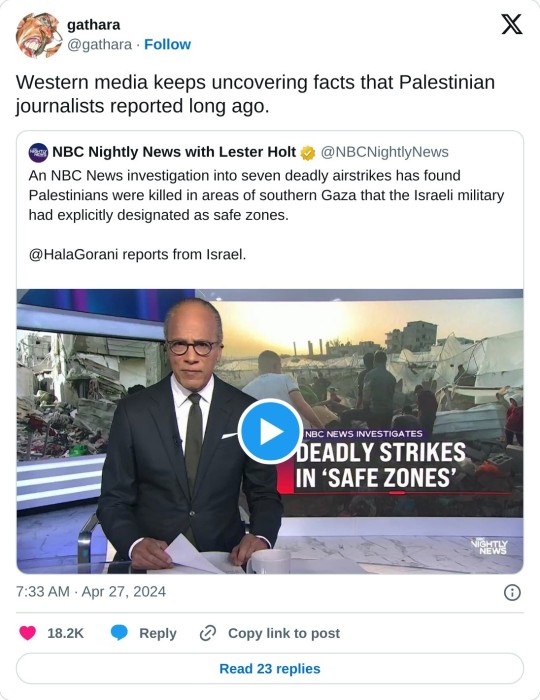
#yemen#jerusalem#tel aviv#current events#palestine#free palestine#gaza#free gaza#news on gaza#palestine news#news update#war news#war on gaza#gaza genocide#genocide#media bias#manufactured consent#palestinian journalists
4K notes
·
View notes
Text
by Dan Perry
The serious international media is most comfortable when it can maintain a comfortable distance from any particular protagonist. Generally, this is wise. It's also good business, because the media is struggling to stay afloat financially and doesn't need the headache of political controversy—as Michael Jordan famously said, Republicans buy sneakers, too. And so, it generally gravitates toward a type of bothsidesism that suggests to readers and viewers that there are no good guys on any given field. Usually, that is sufficiently accurate that it works quite well.
It breaks down when the market of news consumers—or other powerful players—has chosen sides. The media has largely presented Russia's President Vladimir Putin as satanic, and Ukraine's Volodymyr Zelensky as impishly heroic. So, coverage of the Ukraine war has been a tad simplistic and has hardly reflected the Russian case. But this is not, on balance, the worst thing in the world: Putin is odious and Russia's attack on Ukraine was, in the final analysis, a mistake and a crime.
No such luck in the case of the Gaza war. The media has largely stuck to its instincts for impartiality: "Both sides" have their narratives, and both have good and bad. One may be a terrorist group and the other a Western-leaning democracy—but in this era of progressive decolonization narratives, an association with the West will not get you very far with much of the Western media. Ironic.
The Israelis indeed have good and bad. But Israel is a democracy that can dump its useless government and probably will. Israel's mainstream wants to be rid of the conflict with the Palestinians and views the issue largely through the prism of security. Israel has ultranationalists, violent settlers, and religious fanatics, but the bulk of the population inhabit the same Euclidean universe, share the same values, and believe in the same primacy of reason as most news consumers abroad.
None of that can be said of Hamas, and since Hamas is omnipotent in Gaza it should be the center of media scrutiny. It is a violent fundamentalist movement that seeks not just the demise of Israel but also, with its jihadi fellow travelers, of the West. Hamas and its accomplices share none of the values that drive the modern world, from respect for human rights to freedom of speech to the rule of law.
Are so many Westerners, especially Gen Zers, too feeble-minded to get this? Perhaps to a degree. But I say that a major factor is that they are not being informed.
Is it antisemitism on the part of the foreign press corps, as some Israeli partisans will rush to charge? Not much, in my experience. It mostly stems from intellectual laziness typical of our era, a surfeit of cynicism typical of journalists, and a dollop of woke-ish fuzziness.
Some argue that no one appointed journalists to connect the dots for people, and that the wisest approach would be to just "report the facts." The self-righteous just-the-facts school misses something basic. Every nanosecond in the universe throws up an infinity of facts. The choices of which tiny minority among them to pursue and how to present them are already judgement calls.
When the result is the normalization of a monstrosity like Hamas, that is malpractice. Have I been guilty of it myself? All I can say is, like Oscar Schindler in the film, I feel I did not do enough.
46 notes
·
View notes
Text
3 notes
·
View notes
Text
Zapp (german public-financed TV magazine about criticizing german public financed media) ran a story this week about biases in german reporting on the genocide on palestinians. It had an interview with the director of one of the nationwide public broadcasting institutions (ARD). He really said he was surprised on the lack of palestinian voices in german media.
They forgot they fired them. Like Nemi El-Hassan.
#granted he also said “there is no bias in german media because we also have very few israeli voices (9 vs 3)”#yeah but have you looked at the shit german journalists without any link to either say.
2 notes
·
View notes